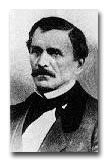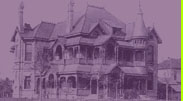GREAT CITIZENS - AUGUSTUS CHAPMAN ALLEN
 Earliest among Houston's greats are the city's founders, the Allen Brothers. They envisioned a thriving metropolis in a place full of lush vegetation where no man had settled before.
Earliest among Houston's greats are the city's founders, the Allen Brothers. They envisioned a thriving metropolis in a place full of lush vegetation where no man had settled before.
One of the founding brothers, was Augustus Chapman Allen, who was born on July 4, 1806, in Canasareaugh, New York, to Sarah (Chapman) and Roland Allen.
Suffering from poor health since childhood, Augustus immersed himself in intellectual pursuits. At the age of seventeen, he graduated from a polytechnic institute in Chittenango, New York, where he later became a professor of mathematics. He resigned from the world of academia in 1827, in order to take the position of bookkeeper with the H. and H. Canfield Company in New York City.
Soon after his brother John joined him in New York City, the two brothers bought stock in the Canfield Company, marking the first enterprise of the fraternal entrepreneurs.
In the winter of 1831-1832 Augustus and John Allen Moved to Texas, arriving first in Galveston and soon thereafter moving to the small town of Saint Augustine. In 1833, they joined a group of land speculators in Nacogdoches and involved themselves in a variety of enterprises, including the procurement and sale of land certificates. Instead of joining the army when the revolution against Mexico began in 1835, the Allen brothers personally equipped and armed a vessel, called the Brutus, and set out to protect the Texas coast and to transport troops and supplies. Following increasing objections to their operations as civilians who were not members of the Texas armed forces, and rumors that they were privateering, the Allen's, in January, 1836, sold the ship at cost to the new Texas government and the Brutus became the second vessel in the fledgling Texas navy.
So, speculating on what to do, the brothers came across some land that they thought truly promising. Financed by an inheritance received by Augustus' wife, Charlotte, on August 26, 1836, the brothers purchased 6,600 acres along the Buffalo Bayou for $5,000, for the purpose of establishing a new city. At the suggestion of Charlotte, they named their town site for the hero of the time, General Sam Houston.
In 1843, Augustus terminated his business relations with his brothers, mainly because he was unhappy with the management of the Allen properties. During the 1840's he began dealings with the president of Mexico, Benito Juarez. His health failing, Augustus transferred the bulk of his various enterprises to Charlotte. Later, in 1859, they separated, pledging to keep the details of their differences forever secret. Augustus left Houston permanently, never to return to the city he founded. Charlotte, however, remained in Houston until her death in 1895.
In 1852, Augustus Allen was appointed United States consul in the Pacific port of Tehuantepec in southern Mexico and later took a position in the port of Minotitlan, in 1858, where he worked to establish a trade route or canal, through Mexico. He also developed an extensive shipping business before becoming critically ill in 1864. He went to Washington, D.C. to resign his consulship and died there of pneumonia on June 11, 1864, just before his fifty-eighth birthday. He was buried in Brooklyn, New York. Houston's Allen parkway, Allen Center as well as Allen's Landing Park, all immortalize the name of the city's founders.






